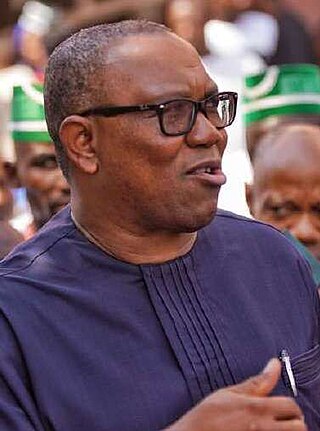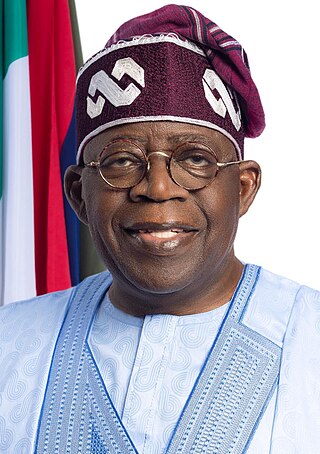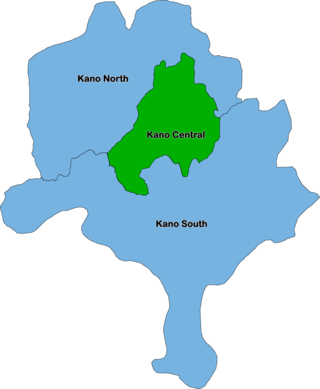
Peter Gregory Obi is a Nigerian politician and businessman who was the Governor of Anambra State under President Olusegun Obasanjo from 17 March 2006 to 3 November 2006, when he was impeached. He was reinstated on 9 February 2007 and continued his tenure until 2010. He was reelected for his second term until 7 March 2014. A member of the Labour Party since 2022, he was the presidential candidate in the 2023 Nigerian presidential election.

Mohammed Rabi'u Musa Kwankwaso, FNSE FNIQS is a Nigerian politician who served as governor of Kano state from 1999 to 2003 and from 2011 to 2015. After he lost his re-election in 2003, he was appointed the first Minister of Defence of the Fourth Republic with no prior military background, from 2003 to 2007, under the administration of President Olusegun Obasanjo. He was later elected to the Senate in 2015, serving one term under the platform of the All Progressives Congress (APC) representing Kano Central Senatorial District.

The All Progressives Congress (APC) is one of the two major contemporary political parties in Nigeria, along with the Peoples Democratic Party (PDP). Founded on 6 February 2013 from a merger of Nigeria's three largest opposition parties, the party came to power following the victory of party candidate Muhammadu Buhari in the 2015 presidential election. This marked the first time in Nigerian history that an opposition party unseated a governing party and power was transferred peacefully.

General elections were held in Nigeria on 23 February 2019 to elect the President, Vice President, House of Representatives and the Senate. The elections had initially been scheduled for 16 February, but the Electoral Commission postponed the vote by a week at 03:00 on the original polling day, citing logistical challenges in getting electoral materials to polling stations on time. In some places, the vote was delayed until 24 February due to electoral violence. Polling in some areas was subsequently delayed until 9 March, when voting was carried out alongside gubernatorial and state assembly elections.

General elections were held in Nigeria on 25 February 2023 to elect the president and vice president and members of the Senate and House of Representatives. Incumbent president Muhammadu Buhari was term-limited and could not seek re-election for a third term. This election was seen as the tightest race since the end of military rule in 1999.

The 2023 Adamawa State gubernatorial election took place on 18 March 2023, to elect the Governor of Adamawa State, concurrent with elections to the Adamawa State House of Assembly as well as twenty-seven other gubernatorial elections and elections to all other state houses of assembly. The election — which was postponed from its original 11 March date — was held three weeks after the presidential election and National Assembly elections. Incumbent Governor Ahmadu Umaru Fintiri (PDP) was re-elected by a 3.75% margin over first runner-up and APC nominee — Senator Aishatu Dahiru Ahmed.

The 2023 Bauchi State gubernatorial election took place on 18 March 2023, to elect the Governor of Bauchi State, concurrent with elections to the Bauchi State House of Assembly as well as twenty-seven other gubernatorial elections and elections to all other state houses of assembly. The election—which was postponed from its original 11 March date—was held three weeks after the presidential election and National Assembly elections. Incumbent PDP Governor Bala Mohammed initially declined to run for re-election, instead running for president. However, after losing the PDP presidential primary in May 2022, Mohammed was renominated in a rerun primary. Mohammed was re-elected as governor by a 9% margin over first runner-up and APC nominee — former Chief of the Air Staff Sadique Abubakar.
The 2023 Borno State gubernatorial election took place on 18 March 2023, to elect the Governor of Borno State, concurrent with elections to the Borno State House of Assembly as well as twenty-seven other gubernatorial elections and elections to all other state houses of assembly. The election—which was postponed from its original 11 March date—was held three weeks after the presidential election and National Assembly elections. Incumbent APC Governor Babagana Umara Zulum has been renominated by his party.
The 2023 Gombe State gubernatorial election will take place on 18 March 2023, to elect the Governor of Gombe State, concurrent with elections to the Gombe State House of Assembly as well as twenty-seven other gubernatorial elections and elections to all other state houses of assembly. The election—which was postponed from its original 11 March date—will be held three weeks after the presidential election and National Assembly elections. Incumbent APC Governor Muhammad Inuwa Yahaya is running for a second term and was renominated by his party.
The 2023 Jigawa State gubernatorial election took place on 18 March 2023, to elect the Governor of Jigawa State, concurrent with elections to the Jigawa State House of Assembly as well as twenty-seven other gubernatorial elections and elections to all other state houses of assembly. The election—which was postponed from its original 11 March date—was later scheduled to hold three weeks after the presidential election and National Assembly elections. Incumbent APC Governor Mohammed Badaru Abubakar is term-limited and cannot seek re-election to a third term.

The 2023 Kano State gubernatorial election took place on 18 March 2023, to elect the Governor of Kano State, concurrent with elections to the Kano State House of Assembly as well as twenty-seven other gubernatorial elections and elections to all other state houses of assembly. The election—which was postponed from its original 11 March date—was held three weeks after the presidential election and National Assembly elections. Incumbent APC Governor Abdullahi Umar Ganduje is term-limited and cannot seek re-election to a third term. Abba Kabir Yusuf of New Nigerian People won the election.
The 2023 Katsina State gubernatorial election took place on 18 March 2023, to elect the governor of Katsina State, concurrent with the elections to the Katsina State House of Assembly as well as twenty-seven other gubernatorial elections and elections to all other state houses of assembly. The election was postponed from its original 11 March date, three weeks after the presidential election and National Assembly elections. Incumbent APC Governor Aminu Bello Masari was term-limited and could not seek for re-election to a third term.
The 2023 Kebbi State gubernatorial election will take place on 18 March 2023, to elect the Governor of Kebbi State, concurrent with elections to the Kebbi State House of Assembly as well as twenty-seven other gubernatorial elections and elections to all other state houses of assembly. The election—which was postponed from its original 11 March date—will be held three weeks after the presidential election and National Assembly elections. Incumbent APC Governor Abubakar Atiku Bagudu is term-limited and cannot seek re-election to a third term.

The 2023 Enugu State gubernatorial election took place on 18th March 2023, to elect the Governor of Enugu State, with Peter Mbah declared winner alongside his running mate Barrister Ifeanyi Ossai of the Peoples Democratic Party (Nigeria), after they got the plurality of votes and won over 25% of the votes in two-third of the state. Mr Mbah polled 160,895 votes to defeat his closest competitor, the Labour Party (Nigeria) candidate, Chijioke Edeoga, who scored 157,552 votes. The candidate of the All Progressives Grand Alliance (APGA), Frank Nweke Jr, garnered 17,983 votes to come a distant third, while the candidate of the All Progressives Congress (APC), Uche Nnaji, came fourth position, with 14,575 votes. The election was contested in the Tribunal by Chijoike Edeoga but the tribunal eventually upheld the victory of Peter Mbah.
The 2023 Nasarawa State gubernatorial election will take place on 18 March 2023, to elect the Governor of Nasarawa State, concurrent with elections to the Nasarawa State House of Assembly as well as twenty-seven other gubernatorial elections and elections to all other state houses of assembly. The election—which was postponed from its original 11 March date—will be held three weeks after the presidential election and National Assembly elections. Incumbent APC Governor Abdullahi Sule is eligible to run for re-election and has been renominated by his party.

The 2023 Oyo State gubernatorial election will take place on 18 March 2023, to elect the Governor of Oyo State, concurrent with elections to the Oyo State House of Assembly as well as twenty-seven other gubernatorial elections and elections to all other state houses of assembly. The election—which was postponed from its original 11 March date—will be held three weeks after the presidential election and National Assembly elections. Incumbent PDP Governor Seyi Makinde was re-elected, winning by a % margin of victory over first runner-up and APC nominee—Senator Teslim Folarin.
The 2023 Plateau State gubernatorial election will take place on 18 March 2023, to elect the Governor of Plateau State, concurrent with elections to the Plateau State House of Assembly as well as twenty-seven other gubernatorial elections and elections to all other state houses of assembly. The election—which was postponed from its original 11 March date—will be held three weeks after the presidential election and National Assembly elections. Incumbent APC Governor Simon Lalong is term-limited and cannot seek re-election to a third term.

The 2023 Nigerian presidential election was held on 25 February 2023 to elect the president and vice president of Nigeria. Bola Tinubu, the former governor of Lagos State and nominee of the All Progressives Congress won the election with 36.61% of the vote, just under 8.8 million votes to defeat over runners-up former vice president Atiku Abubakar and former governor of Anambra State Peter Obi. Other federal elections, including elections to the House of Representatives and the Senate, held on the same date while state elections were held on 18 March. The inauguration was held on 29 May 2023.

The 2023 Nigerian Senate elections in Kano State will be held on 25 February 2023, to elect the 3 federal Senators from Kano State, one from each of the state's three senatorial districts. The elections will coincide with the 2023 presidential election, as well as other elections to the Senate and elections to the House of Representatives; with state elections being held two weeks later. Primaries were held between 4 April and 9 June 2022.

The issues in the 2023 Nigerian presidential election are economic, human, and political issues that were discussed prior to and during the general campaign period from the end of the primary period in June 2022 and the final day of campaigning in February 2023.






















